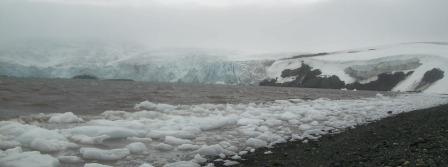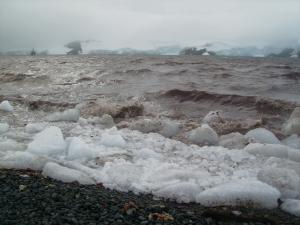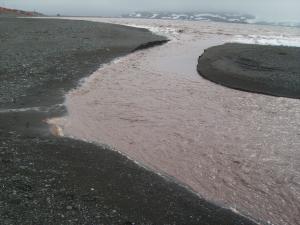Melting glaciers change Antarctic colors - 15 y from white to brown
When I first came to Jubany in October 1995, the surroundings of the station were dominated by the huge Collins glacier.
Gigantic, white and ice masses were covering the island. Global warming, which is especially pronounced in Western Antarctica where mean air temperatures have warmed by around 3°C within the past 50 years, has caused a massive retreat of glaciers all along the Antarctic Peninsula. Returning to Jubany over the years, I could see the glacier shrink, retreat and melt away into dozens of little creeks, finally joining into rivers and melt water streams that discharge into the coastal environments of Potter Cove and around King George Island. As the years went by, the glacier started to thaw as if placed on a hot plate, and coming back today I have to walk quite some time to reach its ragged frontline.
|
|
The tidewater part of the glacier is mostly gone and small rocky islands have emerged from underneath which were ice covered for thousands of years. The rest of the glacier melts on land, and part of the melt water trickles into the ground and forms underwater streams that transport huge amounts of very fine sediment, much the consistence of flour, but not quite as fluffy and of a deep red color from the iron oxide it washes out of the rocks. Glaciologists talk of “glacier mills” and are determining warmer times in earth history from the accumulation of these fine grained particles in sediment cores. Thus, thawing land glaciers not only drain water into the ocean and let the sea level rise, but they also mill away the rocks underneath.
Glacial abrasion changes the coastal ecosystems. First of all, as you can see on the fotos, the transparent blue waters typical for Antarctica, are not any more typical for this area. The fluffy sediments form an approximately 5 m thick run-off layer in the water. These fine sediments eventually sink to the bottom and cover animals and plants with a thick sludge layer. Some sensitive animals, previously abundant in Potter Cove, have already left this area. Algae are shaded by the sediment and cannot grow as fast or not at all under the sediment plume, and the composition of phytoplankton communities in Potter Cove changes dramatically as run-off intensifies during the Antarctic summer.
|
|
|
Thus change is happening and it is happening fast. As Jubany scientists we are lucky because we have 20 years of observational series in Potter Cove. The data sets documenting the change in a West Antarctic coastal environment with high resolution in space and time are a real treasure in Antarctic research They enable to quantify change and investigate the interacting forces that drive the glacial retreat on our little island. In collaboration with American (Palmer Station), British (Rothera) and our Polish (Arctowski Station) scientists we may even be able to integrate this into a bigger picture of the changes happening in Western Antarctica.
Many colleagues, especially Argentine planktologists and overwintering scientists, have participated in these investigations over the years. Many hours have been spent in boats in the cold weather of Antarctica, hundreds of water column salinity and temperature profiles, plankton samples etc have been analyzed to prove that climate change exists and quantify its effects. And walking along here by myself, I deeply want to thank Oscar Gonzalez, Ariel Morretini, Gaston Aguirre, Alejandro Ajo, Leo Cantoni and our current overwinterer Maxi Garcia, as well as many others for your enormous work in bringing these data together.
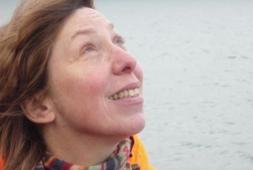 |
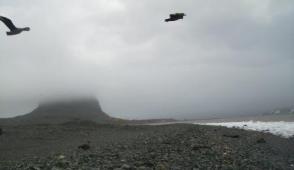 |
However, here I am now, alone with the skuas, big grey Antarctic seagulls drawing curious circles over my head, at times diving down on me in well aimed surfing flights, lifting up directly in front of my face. And so, I take my fotos of the glacier and walk home, thanking my friend Oscar Gonzalez for teaching me not to freak when skuas shriek. Thanks Oscar! Took me only 11 years!
Post your comment
Posting comments has been disabled.
Comments
-
Wow! Is it changing that quickly? that really is alarming...
Posted by Anna, 31/01/2011 10:34am (11 years ago)
RSS feed for comments on this page | RSS feed for all comments


